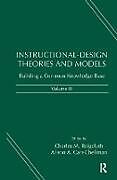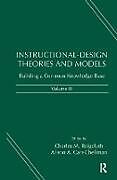Instructional-Design Theories and Models, Volume III
Einband:
Fester Einband
EAN:
9780805864564
Untertitel:
Building a Common Knowledge Base
Genre:
Pädagogik
Herausgeber:
Taylor & Francis
Anzahl Seiten:
432
Erscheinungsdatum:
01.02.2009
ISBN:
978-0-8058-6456-4
Zusatztext Winner of the 2011 AECT Foundation James W. Brown Publication Award"A major strength of these volumes lies in the organization and presentation of the ideas they contain...A source book, these volumes could continue to provide novice and experienced teachers valuable, theoretical supports as they design instruction to address specific student-defined instructional needs."--Education Review, September 2009"one of the most thought-provoking academic works on the leading instructional-design paradigm in educational technology (ET) and beyondThis book is well structured and almost seamless."--British Journal of Educational Technology, 2009"Reigeluth...brings together an impressive collection of theorists and practitioners...to update earlier perspectives on the design of instruction by sharing the results of their research and theory building."--Educational Technology & Society, 13 (2), 219-221, 2010"This is a valuable book that will especially appeal to those interested in what is one of the most fundamental questions in education, namely, how can teachers and instructors help people to learn better?"--Teaching Theology and Religion Informationen zum Autor Charles M. Reigeluth is a Professor in the Instructional Systems Technology department at Indiana University. Alison A. Carr-Chellman is a Professor of Education (Instructional Systems) in the Learning and Performance Systems department at The Pennsylvania State University. Klappentext Instructional-Design Theories and Models, Volume III: Building a Common Knowledge Base is best described by its new subtitle. Whereas Volume II sought to comprehensively review the proliferating theories and models of instruction in the 1980's and 1990's, Volume III takes on an even more daunting task: starting to build a common knowledge base to underlie and support the array of instructional theories, models and strategies that constitute the field. Zusammenfassung Describes the need for a common knowledge base, offers some universal principles of instruction, and addresses the need for variation and guidance when implementing the universal principles. This title also describes how the universal principles apply to some major approaches to instruction such as direct instruction or problem-based instruction. Inhaltsverzeichnis UNIT 1: FRAMEWORKS FOR UNDERSTANDING INSTRUCTIONAL THEORY 1. Understanding Instructional Theory, Charles M. Reigeluth & Alison Carr-Chellman 2. Understanding Instruction, Charles M. Reigeluth & John B. Keller 3. First Principles of Instruction, M. David Merrill 4. Situational Principles of Instruction, Charles M. Reigeluth & Alison Carr-Chellman UNIT 2: THEORIES FOR DIFFERENT APPROACHES TO INSTRUCTION 5. Direct Approach to Instruction, William G. Huitt, David M. Monetti, & John H. Hummel 6. Discussion Approach to Instruction, Joyce Taylor Gibson 7. Experiential Approach to Instruction, Lee Lindsey & Nancy Berger 8. Problem-Based Approach to Instruction, John R. Savery 9. Simulation Approach to Instruction, Andrew S. Gibbons, Mark McConkie, Kay Kyeongju Seo, & David Wiley UNIT 3: Theories for Different Outcomes of Instruction 10. Fostering Skill Development Outcomes, Alexander Romiszowski 11. Fostering Understanding Outcomes, Martha Stone Wiske & Brian J. Beatty 12. Fostering Affective Development Outcomes: Emotional Intelligence, Barbara Bichelmeyer, James Marken, Tamara Harris, Melanie Misanchuk, & Emily Hixon 13. Fostering Integrated Learning Outcomes across Domains, Brian J. Beatty UNIT 4: TOOLS FOR BUILDING A COMMON KNOWLEDGE BASE 14. The Architecture of Instructional Theory, Andrew S. Gibbons & P. Clint Rogers 15. Domain Theory for Instruction: Mapping Attainments to Enable Learner-Centered Education, C. Victor Bunderson, David A. Wiley, ...
Winner of the 2011 AECT Foundation James W. Brown Publication Award "A major strength of these volumes lies in the organization and presentation of the ideas they contain...A source book, these volumes could continue to provide novice and experienced teachers valuable, theoretical supports as they design instruction to address specific student-defined instructional needs."--Education Review, September 2009 "one of the most thought-provoking academic works on the leading instructional-design paradigm in educational technology (ET) and beyondThis book is well structured and almost seamless."--British Journal of Educational Technology, 2009 "Reigeluth...brings together an impressive collection of theorists and practitioners...to update earlier perspectives on the design of instruction by sharing the results of their research and theory building."--Educational Technology & Society, 13 (2), 219-221, 2010 "This is a valuable book that will especially appeal to those interested in what is one of the most fundamental questions in education, namely, how can teachers and instructors help people to learn better?"--Teaching Theology and Religion
Autorentext
Charles M. Reigeluth is a Professor in the Instructional Systems Technology department at Indiana University.Alison A. Carr-Chellman is a Professor of Education (Instructional Systems) in the Learning and Performance Systems department at The Pennsylvania State University.
Klappentext
Instructional-Design Theories and Models, Volume III: Building a Common Knowledge Base is best described by its new subtitle. Whereas Volume II sought to comprehensively review the proliferating theories and models of instruction in the 1980's and 1990's, Volume III takes on an even more daunting task: starting to build a common knowledge base to underlie and support the array of instructional theories, models and strategies that constitute the field.
Zusammenfassung
Describes the need for a common knowledge base, offers some universal principles of instruction, and addresses the need for variation and guidance when implementing the universal principles. This title also describes how the universal principles apply to some major approaches to instruction such as direct instruction or problem-based instruction.
Inhalt
UNIT 1: FRAMEWORKS FOR UNDERSTANDING INSTRUCTIONAL THEORY1. Understanding Instructional Theory, Charles M. Reigeluth & Alison Carr-Chellman2. Understanding Instruction, Charles M. Reigeluth & John B. Keller3. First Principles of Instruction, M. David Merrill4. Situational Principles of Instruction, Charles M. Reigeluth & Alison Carr-ChellmanUNIT 2: THEORIES FOR DIFFERENT APPROACHES TO INSTRUCTION5. Direct Approach to Instruction, William G. Huitt, David M. Monetti, & John H. Hummel 6. Discussion Approach to Instruction, Joyce Taylor Gibson7. Experiential Approach to Instruction, Lee Lindsey & Nancy Berger8. Problem-Based Approach to Instruction, John R. Savery9. Simulation Approach to Instruction, Andrew S. Gibbons, Mark McConkie, Kay Kyeongju Seo, & David WileyUNIT 3: Theories for Different Outcomes of Instruction10. Fostering Skill Development Outcomes, Alexander Romiszowski11. Fostering Understanding Outcomes, Martha Stone Wiske & Brian J. Beatty12. Fostering Affective Development Outcomes: Emotional Intelligence, Barbara Bichelmeyer, James Marken, Tamara Harris, Melanie Misanchuk, & Emily Hixon 13. Fostering Integrated Learning Outcomes across Domains, Brian J. BeattyUNIT 4: TOOLS FOR BUILDING A COMMON KNOWLEDGE BASE14. The Architecture of Instructional Theory, Andrew S. Gibbons & P. Clint Rogers15. Domain Theory for Instruction: Mapping Attainments to Enable Learner-Centered Education, C. Victor Bunderson, David A. Wiley, & Reo McBride16. Learning Objects and Instructional Theory, David A. Wiley17. Theory Building, Charles M. Reigeluth & Yun-Jo An18. Instructional Theory for Education in the Infor…

Leider konnten wir für diesen Artikel keine Preise ermitteln ...
billigbuch.ch sucht jetzt für Sie die besten Angebote ...
Die aktuellen Verkaufspreise von 6 Onlineshops werden in Realtime abgefragt.
Sie können das gewünschte Produkt anschliessend direkt beim Anbieter Ihrer Wahl bestellen.
Loading...
Die aktuellen Verkaufspreise von 6 Onlineshops werden in Realtime abgefragt.
Sie können das gewünschte Produkt anschliessend direkt beim Anbieter Ihrer Wahl bestellen.
| # | Onlineshop | Preis CHF | Versand CHF | Total CHF | ||
|---|---|---|---|---|---|---|
| 1 | Seller | 0.00 | 0.00 | 0.00 |
